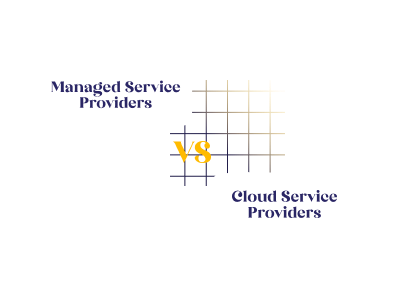IT organizations are the most valued business worldwide offering different solutions to their different clients. They mostly deal in software domain, cloud, and other services. Now, with the growing tech demand of businesses and modernization of them, the demand of cloud infrastructure is required. Many of you might think that cloud service providers and managed service providers are the same, but they are not! The difference between a managed service provider and a cloud service provider is deep and thus we brought this guide for you.
Below in the article, we will differentiate between both of them and you will understand how they both differ? After reading this article, different size businesses who are unaware of both these terminologies, will determine the right fit for their businesses.
Managed Service Providers
To put simply, managed service providers are those organizations that offer specific niche services that cater to different industry segments. Every organization nowadays is looking for digital marketing infrastructure. So, there are professional service providers offering solutions. Managed Service Provider providers are also a kind of service provider.
In businesses, there are different IT needs that should be met. We are sure that being a business owner, you also might have different digital requirements but not enough resources to meet them. This is where top managed service providers assist you giving the managed infrastructural support to transform your business. Recently, cloud providers are creating the buzz because many organizations are preferring cloud infrastructure to manage their data. Like every other service provider, they also charge clients on the subscription model.
The subscription model is basically helpful for businesses because every month a nominal subscription amount is what they have to pay instead of investing in setting up an entire infrastructure.
Related: Types of Managed Services: Discussing Your Options
Cloud Services Provider
The terms “cloud computing” and “managed services” are familiar to most people who turn even a casual ear toward information technology trends, but not everyone understands the difference between them. Comparing Cloud Service Providers vs. Managed Service Providers At least not until the time comes when they need cloud hosting services and have to investigate the features and benefits of each option. This article will help you understand the main differences between these services, so you can decide which is best for your business.
Rather than maintaining and managing hard drives in your office, cloud computing allows you to store and access your programs, applications, and data online. Providers of cloud services offer services such as:
The term “Software as a Service” (SaaS) refers to the process of accessing software over the Internet on an as-needed basis. It is usually available on a subscription basis or as a pay-per-use service. Updates, data backups, and security services are also included in SaaS.
By using Platform as a Service (PaaS), clients can run their programs on a provider’s servers, eliminating the need to maintain their own.
IaaS (Infrastructure as a Service): The provider provides storage to corporate clients so they can scale their storage as needed.
Related: Benefits of Managed Cloud Services
Managed Hosting Vs Cloud Hosting: Are There Any Similarities?
Both managed hosting and cloud hosting are helpful and reliable because the server configurations you will be getting are advanced ones. Control panels, domain hosting and the technical support you will get in both kinds of hosting solutions. The primary difference is the resources and support available to you through a Managed Services provider.
In today’s ever-evolving digital landscape, choosing the right web hosting solution is crucial for businesses and individuals alike. Among the myriad hosting options available, Managed Service Provider and Cloud Service Provider are often at the forefront of discussions. Let’s delve deep into the differences, advantages, and potential drawbacks of each, to help you make an informed choice.
Managed Service Provider vs Cloud Service Provider
Scalability
- Managed Service Provider: Limited scalability. You are often restricted to the resources of your dedicated or shared server.
- Cloud Service Provider: High scalability. You can quickly scale resources (CPU, RAM, storage) up or down based on traffic demands.
Performance:
- Managed Service Provider: Performance is generally stable unless you reach the limit of your server’s resources.
- Cloud Service Provider: Often offers high performance due to the distributed nature of resources, ensuring redundancy.
Reliability & Uptime:
- Managed Service Provider: Reliability depends on the physical server. If there’s an issue with the server, the site might go down.
- Cloud Service Provider: Higher reliability because even if one server in the network fails, others can compensate, ensuring continuity and uptime.
Flexibility:
- Managed Service Provider: Less flexibility in terms of server configurations, as the provider manages the environment.
- Cloud Service Provider: Offers more flexibility, especially if you’re comfortable with server management or if you’re using managed cloud solutions.
Management and Maintenance
- Managed Service Provider: The hosting provider takes care of most server-related tasks, providing a hands-off experience for the user.
- Cloud Service Provider: Management depends on the chosen package. While you can have managed cloud solutions, some cloud hosting packages require more hands-on server management by the user.
Cost:
- Managed Service Provider: Pricing is often fixed, based on the plan or resources allocated.
- Cloud Service Provider: Typically has a pay-as-you-use model, making it cost-effective for varying levels of traffic.
Security
- Managed Service Provider: High security with dedicated measures in place. The hosting provider typically manages security patches, malware scans, and firewall configurations.
- Cloud Service Provider: While cloud hosting can be secure, the distributed nature might raise concerns for some users. Proper configuration and regular maintenance are vital.
Benefits of Managed Service Provider
1. Easy to Scale Up or Down as Required
Your business and industry is a part that will continually evolve. Organizations are using the modern day infrastructure where they handle volumes of applications. However, to manage them you need more hands and expertise involved to make the operational processes smoother. As a result, you can easily scale resources up or down as per your requirement because your core activity will be dealing with your website operations.
2. A Preventive Approach
There will always be professional support that will give you the right path and give you the best outcome in your IT infrastructure. A professional support in IT will give you the best outcome in your business. Many ERP skills that you want to learn and acquire while deploying the IT infrastructure might go missing. Thus, a professional managed service provider is the right place to learn.
Drawbacks Of Managed Service Provider
- Cost: Generally more expensive than basic shared hosting or other services due to the array of services provided.
- Less Control: As the third company handles most tasks, you have less control over server configurations.
Benefits of Cloud Services
1. Cost-effective
Setting up an IT advanced infrastructure for your business is required in this digitally transformed era. And the major concern that makes business owners opt for the cloud service is to save money and run business smoothly. In cloud services, clients have to pay as per they use computing resources.
2. Data security
Many enterprises are concerned about their data security. Data in today’s date is very crucial. Files, programs and applications are something you must keep secure. All of them contain sensitive information that is essential for your business. Thus, cloud computing is configured to keep all of your data safe and secure.
Drawbacks Of Cloud Service Provider
- Complexity: Might be overwhelming for beginners without a managed cloud solution.
- Security Concerns: With data spread out across multiple servers, some businesses might have concerns over data security.
Managed servers and the cloud hosting solutions both offer relevant resources to run large websites and mission-critical applications. There is no dedicated server space with shared hosting, so VPS is more secure and stable. Even so, renting a single server is more expensive than renting a whole one. Hosting on a virtual private server is usually chosen by website owners who have medium-level traffic, but don’t need the resources of a dedicated server.







